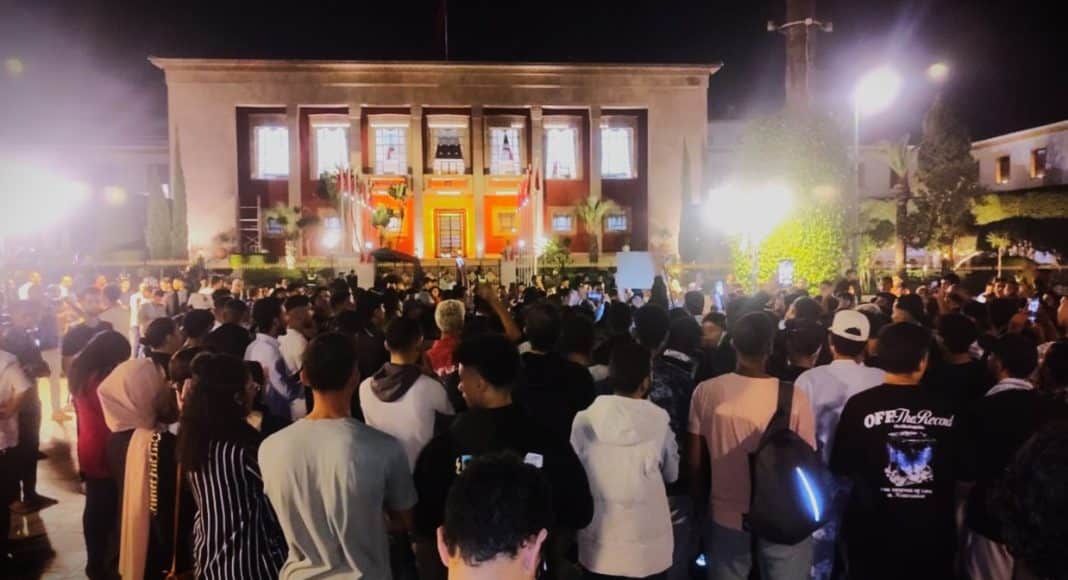Since late September, there have been daily nationwide protests, driven largely by young people and known as the ‘Gen Z 212 movement’ (after the country’s international dialling code, +212). The protests are being coordinated through social media platforms – particularly on Discord, but also on other platforms like Facebook and Instagram. Demonstrations have occurred across the country and in the major cities of Casablanca, Rabat, Tangier, Marrakech and Agadir. AMEERA MAHMOUD reports from Morocco.
The protesters are demanding:
- improvements to public infrastructure particularly in the education and healthcare sectors;
- job creation and an increase in wages;
- control of inflation;
- an end to corruption;
- and government accountability.
The material conditions in Morocco are punishing. There are fewer than 15,000 public doctors in Morocco serving a population of 36 million (4 per 10,000 people). More than one third of Morocco’s young people are without work, with many of those that are employed, in insecure informal work.
At the same time, the government pours billions into tourist projects such as the Casablanca-Tangier high-speed train, and $80m was spent renovating Rabat’s Prince Moulay Abdellah Stadium ahead of the African Cup of Nations for the end of this year, and 2030 World Cup preparations, while working-class and rural communities remain deprived of basic services. The immediate spark for these protests came in mid-September after eight pregnant women died following caesarean sections at a public hospital in Agadir. Protests against deteriorating public health services expanded into wider protests against inequality and poverty in Morocco.
The ongoing protests have led to over 400 people arrested, with around 130 due to stand trial. There has also been an escalation of state violence in some areas: in Lqliaa, near Agadir, police killed three protesters; and in Oujda, a police vehicle drove into protesters, injuring several and causing one protester to lose both legs.
The GenZ 212 movement has no formal leadership and is not affiliated with any political parties but is coordinated online. Organisers stress a commitment to peaceful protest and have submitted a petition to King Mohammed VI, invoking constitutional provisions that allow him to dismiss the unpopular government of billionaire Prime Minister Aziz Akhannouch and his neo-liberal National Rally of Independents party.
The King is just as corrupt as the Prime Minister. He not only maintains normalisation ties to Israel, but his purchase of a £75m Paris mansion drew public outrage, particularly after the 2023 earthquake in Morocco that killed nearly 3,000 people. Many survivors still live in tents in the Al Haouz region to this day. What we are seeing now is, in many ways, an echo of the Arab Spring of 2011. The demands are the same. The King passed limited constitutional reforms after the Arab Spring to diffuse the situation but since then, the situation in Morocco has shown little improvement.
Palestine solidarity in Rabat
On Sunday 5 October, a massive national demonstration for Palestine was held in Rabat, marking the 2nd anniversary of the 7 October 2023 Al-Aqsa Flood operation by the Palestinian resistance. The demonstration was organised by the Moroccan Front for the Support of Palestine and Anti-Normalisation. Hundreds of thousands marched demanding the end of normalisation with Israel and expressing solidarity with Gaza. There were many chants from the GenZ 212 movement making the link between anti-imperialist struggle and resistance to Zionism, and the corruption of the Moroccan ruling class.
In September there were also protests in the city of Essaouira against a Zionist religious ceremony calling for the victory of the genocidal IDF, and a conference called the ‘International Forum of Women for Peace’, both events attended by Israeli and Moroccan officials. Essaouira is a hub of Zionist cultural activity in Morocco. In response protests were called on by several organisations including the Zahraa Forum for Moroccan Women denouncing all forms of cultural and feminist normalisation with the Zionist entity.
In 2020, Morocco signed a normalisation agreement with Israel, brokered by the first Trump administration. In exchange for Morocco formalising its already extensive cooperation with the Zionist state, the US recognised Morocco’s claim over the occupied Western Sahara, offered up to $3 billion in US financing for Moroccan private investments (including in the interests of King Mohammed), and allowed Morocco to purchase advanced F-35 fighter jets and military drones from US arms companies. The ruling class in Morocco is directly profiting from imperialism, from the genocide in Gaza, and from the exploitation of Western Sahara’s rich natural resources in cooperation with European and US corporations. Moroccan youth are challenging this bloody system.




